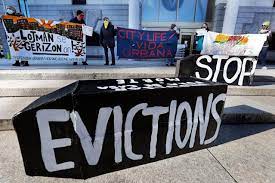Vidya Sethuraman
India Post News Service
CDC Director Dr. Rochelle Walensky signed an order determining the evictions of tenants for failure to make rent or housing payments could be detrimental to public health control measures to slow the spread of SARS-CoV-2, the virus that causes COVID-19. This order will expire on October 3, 2021 and applies in United States counties experiencing substantial and high levels of community transmission. The eviction moratorium allows additional time for rent relief to reach renters and to further increase vaccination rates.
Millions of U.S. families fell behind on their rent amid the Covid pandemic and record levels of unemployment. The Centers for Disease Control last week extended a federal moratorium on evictions until October 3. Speakers discussed the federal eviction moratorium and whether it may need another extension. They also discussed $47 billion in federal aid available to renters and small landlords, and the barriers to accessing aid at the EMS briefing on August 13. Once the moratorium expires, experts say that the number of evictions could skyrocket.
Landlords have voiced opposition to this moratorium and there have been numerous legal challenges as they’re forced to bear the brunt. They argue that they shouldn’t have to house people for free or shoulder massive rental arrears that could be as high as $70 billion throughout the U.S.
Francisco Duenas, Executive Director, Housing Now, California said more than 11 million Americans are behind on their rent and many could face eviction. Many tenants are forced to become homeless because they do not want to keep a record of being evicted, said Francisco. Till now, California has not yet enacted the right to provide tenants with legal advice. He expects the California government to expand the provision of tenant education and consulting services so that they can protect themselves.
Juan Pablo Garnham, Audience and Community Engagement Editor at the Eviction Lab at Princeton University said the federal government has provided landlords with channels for obtaining mortgages or other loans. He recommended that the landlord could negotiate with the bank and perhaps get more financial assistance. The pandemic has also exacerbated racial inequalities too. Of course, the risk of eviction is higher for low-income families too, as these are far more likely to have problems paying the rent.
Dr. Shawnita Sealy-Jefferson, Principal Investigator and leader of the Social Epidemiology to Eliminate Disparities (SEED) Lab at Ohio State University said people of color are disproportionately impacted, that’s not new. She believes that when most tenant families face eviction, their mental conditions will be affected and many get into depression. There are also many tenants who live with their elderly and children without safe housing that is depriving people of their right to normal life, and depriving their children of their yearning for a better future.
The actual number of evictions depends on the speed of relief distribution, pace of economic recovery and decision-making by landlords, so it is extremely important that this assistance gets to renters in need to ensure people can stay in their homes.







